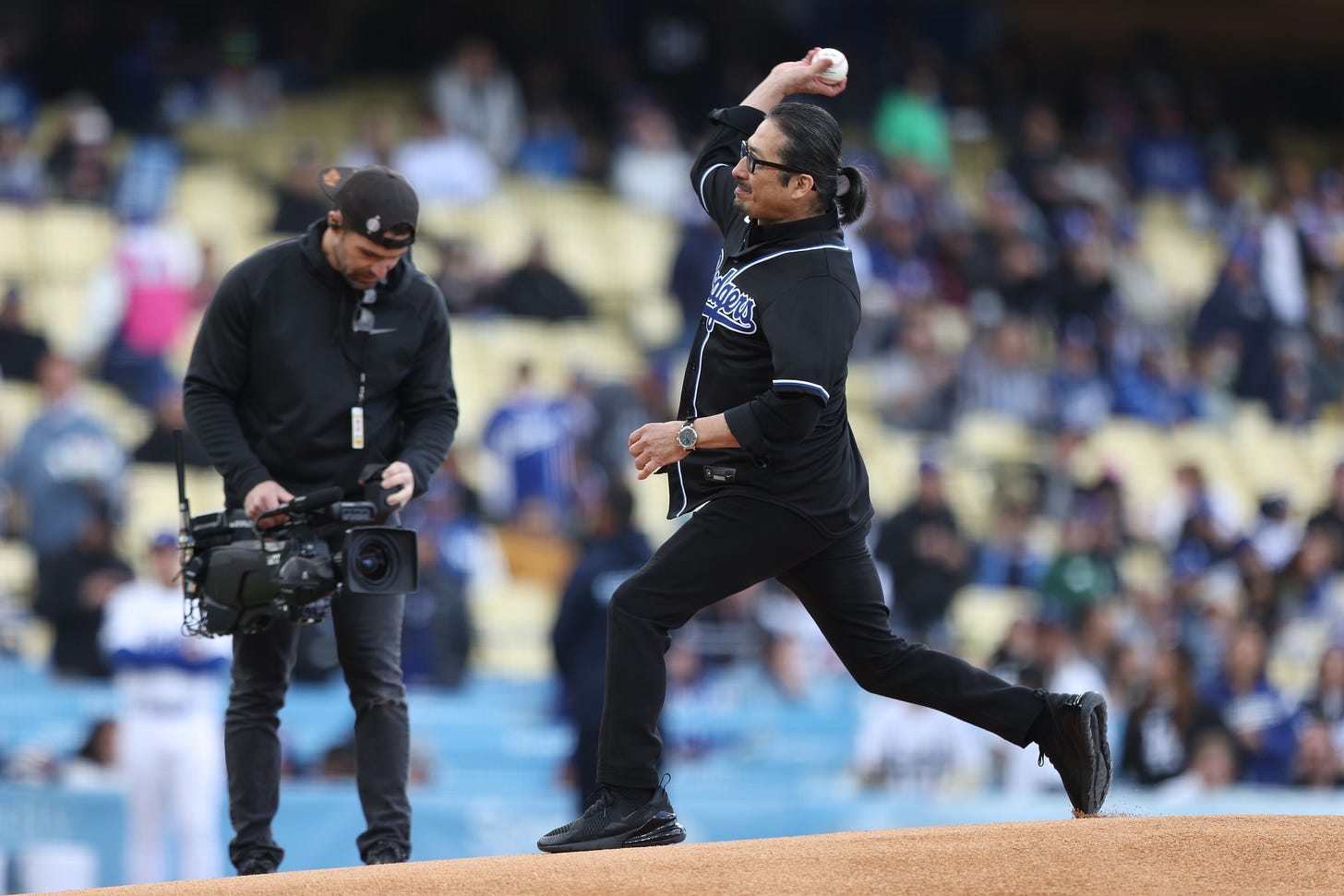Meet the Secret Weapon of 'Shogun’
I talk to star Hiroyuki Sanada; 'Megalopolis' mega-mess; what the DNC and Oscars have in common
The speeches were running long, the applause breaks were indulgent and 11 p.m. — the time it was supposed to all be wrapped up — loomed with a lot more show to go. If you’ve ever produced, participated in or even watched the Oscars at home, you might have felt a real sense of déjà vu watching the Democratic National Convention this week.
Sure, neither the Oscars or the DNC are ratings juggernauts on the level of many NFL games, and the percentage of people posting about them live on social media is even smaller. But for those of us within both of those bubbles, there was something extremely true about this BlueSky post from New York Times critic James Poniewozik, who often puts his critical eye toward more political live TV spectacles.
Because the Democratic and Republican conventions only happen once every four years and air on every cable news channel as well as C-SPAN, there will probably be no recriminations about shortening up the show or efforts to hire attractive young hosts to boost appeal. But it was nice for this Oscar die-hard, at least, to see that other live TV events can run into the same hurdles as my beloved awards shows — and, for the people who are committed to watching anyway, get away with it.
That’s about the extent of my hot takes on the DNC, which I have eagerly watched all week when I wasn’t busy building and re-building my TIFF festival schedule. In this week’s dispatch, I’ve got a conversation with Emmy nominee Hiroyuki Sanada, both the star and a key creative force behind FX’s Shogun. For decades, he’s been an informal cultural adviser for Hollywood films dealing with Japanese history or characters, but made that role official as a producer on Shogun — and he’s got plenty more big ideas where that came from.
But first: Why in the world would 50-year-old critical pans of a now-beloved classic be used as marketing materials for a new release? Even bigger question: Why would they be fake pans? Welcome to the mind of Francis Ford Coppola.
A Mega Embarrassing Moment

Many critics have already had their say on Francis Ford Coppola’s Megalopolis, with mixed reviews from its Cannes premiere calling it everything from “magical, meandering, maddening” to “a passion project gone horribly wrong.” With a theatrical release scheduled for Sept. 27, and a slot at the Toronto Film Festival coming a few weeks before that, now is the time for distributor Lionsgate and Coppola himself to encourage audiences to decide for themselves.
It seemed like they had come up with a pretty good strategy, releasing a trailer that led with critical pans of Coppola masterpieces The Godfather, Apocalypse Now and Bram Stoker’s Dracula, paired with voiceover from Laurence Fishburne promising that “true genius is often misunderstood.”
But as it turns out, as first reported by Vulture’s Bilge Ebiri, is that these weren’t even real quotes; Pauline Kael loved The Godfather, and Roger Ebert’s harsh words for Dracula are actually from his review of Batman.
Within a few hours of Ebiri’s story, the Megalopolis trailer had been pulled from the internet entirely. Lionsgate put out a pretty frank apology: "Lionsgate is immediately recalling our trailer for Megalopolis. We offer our sincere apologies to the critics involved and to Francis Ford Coppola and American Zoetrope for this inexcusable error in our vetting process. We screwed up. We are sorry.”
Sure, it’s possible this was a many-layered plan to put in the fake quotes and get the attention of the precise corners of Film Twitter who are most likely to go to bat for this movie. All publicity is good publicity! But the trailer’s disappearance suggests this is not so much a well-executed stunt but rather an ill-thought, possibly AI-generated experiment gone wrong.
It’s a shame that the bungled part of this trailer will inevitably overshadow the bolder swings — when was the last time you even heard a trailer with a narrator? I haven’t seen Megalopolis, and I have no idea how likely it is to get a critical resurrection this fall — given that Coppola has made four films this century, all met with various levels of shrugs, I’m not sure how high a ceiling he can reach.
But despite all this nonsense, I’m doubling my efforts to secure a ticket to the Monday night Megalopolis screening in Toronto. However it turns out, I sure don’t want to miss it.
The Shogun Master

Hiroyuki Sanada has been paying attention to every aspect of film production quite literally as long as he can remember. The 63-year-old Shogun star got his start in movies when he was just six years old, starring opposite martial arts star Sonny Chiba in a trilogy of yakuza (gangster) films. And even then, he knew he never wanted to be anywhere else.
“Before I started filming, I had never seen a movie at the theater,” Sanada told me in a recent call from his home in Los Angeles, where he’s been based since the early 2000s. “So my movie experience is all on set. I already felt like, yeah, I want to continue and be an actor in the future or something like that. Already I couldn’t think of other things.”
Sanada’s career in Japan and Hong Kong continued into his adulthood, but it was after two big breaks in the West — first a production of King Lear with the Royal Shakespeare Company, then a role in 2003’s The Last Samurai — that he realized the unique role he could play in Hollywood.
“The Last Samurai experience changed my life,” Sanada says. “I think between east and west, I felt a little wall between us. But during the shooting and the half-year of post-production, I stayed as a crew advisor about our culture. I felt, if there still is a wall, I want to break it.”
For more than two decades Sanada wasn’t just an actor in Lost, The Wolverine and Westworld, but what he calls a “bridge” between his home country and his adopted one. He wanted to make sure Japan was represented properly, but also to open the door for more Japanese actors to follow in his footsteps. “It was a little hard, and I spent a long time,” says Sanada. “But for the next generation I want to make a good example that’s then easy to follow.”
Sanada had given all of this advice and guidance informally for years, knowing that as an actor there were limits to how much he could do. So when Shogun creators Rachel Kondo and Justin Marks asked him not only to play the imposing leader Toranaga, but to be a producer on the series, it was less a promotion than a confirmation of the skills he’d been bringing to set all along.
As producer and cultural consultant on Shogun, a role he will reprise for the show’s second season, Sanada had a hand in everything from casting to hiring the Japanese crew to adjusting the posture of his fellow actors for maximum historical accuracy. He worked alongside Kondo and Marks throughout the many-year process of developing the series, and was on set every day, whether he was shooting or not.
In his role as Toranaga, the canny samurai whose decisions drive much of the story in Shogun, Sanada carries a quiet, almost innate authority. That seems to have carried over in real life as well. “All of the actors believed me and followed my advice, as a producer or as an actor,” he says. “We have the same language as actors, so even one word could change their performance easily, and then they would immediately understand what I’m saying.”
With the second season of Shogun in development and a role already filmed in the upcoming Mortal Kombat 2, Sanada is as busy as he’s ever been, taking meetings and reading scripts at a pace that reflects Shogun’s massive success. He calls the show “a stepping stone for the future,” not just for shows in the Japanese language but for any international production.
He’s ready to keep being that bridge between his two countries on set, so long as it’s in a producer role that gives him the power to do it right. But as an actor, he says, he’s ready to expand even further, to take a role “that’s not necessarily Japanese, not necessarily carrying our culture. Just a human being on the earth, or universe.”







